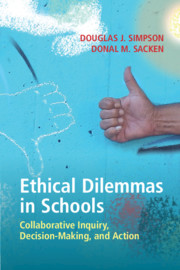Book contents
- Ethical Dilemmas in Schools
- Ethical Dilemmas in Schools
- Copyright page
- Contents
- Figures
- Foreword
- Preface
- Acknowledgments
- Chapter 1 What Can Educators Expect from Ethics?
- Chapter 2 What Does Sympathy or Empathy Have to Do with Ethics?
- Chapter 3 How Are Ethical Principles Useful?
- Chapter 4 What Does Regard for People Imply?
- Chapter 5 What Is a Problematic Ethical Situation?
- Chapter 6 What Are the Qualities of an Ethical Educator?
- Chapter 7 What Are the Characteristics of a Good School?
- Epilogue
- Appendix An Interview with Maria
- References
- Index
- References
Chapter 5 - What Is a Problematic Ethical Situation?
Published online by Cambridge University Press: 18 December 2020
- Ethical Dilemmas in Schools
- Ethical Dilemmas in Schools
- Copyright page
- Contents
- Figures
- Foreword
- Preface
- Acknowledgments
- Chapter 1 What Can Educators Expect from Ethics?
- Chapter 2 What Does Sympathy or Empathy Have to Do with Ethics?
- Chapter 3 How Are Ethical Principles Useful?
- Chapter 4 What Does Regard for People Imply?
- Chapter 5 What Is a Problematic Ethical Situation?
- Chapter 6 What Are the Qualities of an Ethical Educator?
- Chapter 7 What Are the Characteristics of a Good School?
- Epilogue
- Appendix An Interview with Maria
- References
- Index
- References
Summary
In Chapter 1, we briefly consider the question, What is a problematic ethical situation? In that chapter, we give attention to the relationship of diverse expectations in reflective inquiry, including seeking to resolve or solve ethical problems. In a related vignette, we note that Irene Sebastian, a third-grade Academy teacher, had been reported for screaming at her students. From that chapter, a person could say that an ethical situation involves making a practical decision about what should or should not be done (LW 7, 9), e.g., What needs to be investigated to clarify what Irene had done, and how should Maria and Academy colleagues respond to the situation? For Dewey, a problematic situation involves these kinds of ought questions and more, including complexities that may not be readily apparent. While tackling this subject, he notes how his views differ on occasion from others’ conclusions. For example, in Ethics, one of his interests is to explain that moral situations entail doubts and perplexities brought about when “different desires promise opposed goods” (164).
- Type
- Chapter
- Information
- Ethical Dilemmas in SchoolsCollaborative Inquiry, Decision-Making, and Action, pp. 94 - 129Publisher: Cambridge University PressPrint publication year: 2020

